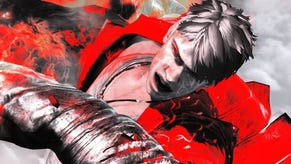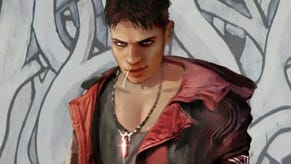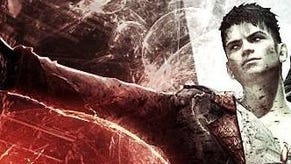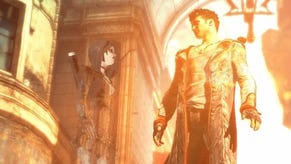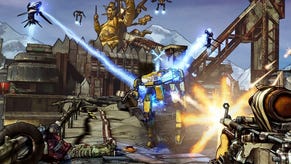DmC: Devil May Cry
The news that Devil May Cry was to get a renovation was probably the most controversial announcement of this year's Tokyo Game Show. The words 'series reboot' are enough to jangle any fan's nerves, and the trailer proved divisive.
A younger Dante – angsty, slightly ungainly, with black hair worn in a lanky emover – and a new, UK developer? Even the series' original creator, Hideki Kamiya, weighed in on Twitter.
But Capcom's Hideaki Itsuno, who's worked on all four Devil May Cry games, has confidence that Ninja Theory are the ones for the job. So does producer Motohide Eshiro and Capcom America's Alex Jones, both of whom are intimately involved with managing the project. Ninja Theory's co-founder and chief creative chap Tameem Antoniades had a chat with us too, to offer the developer's perspective.
We're not going to be definitive about a lot tonight, but one thing that we can be definitive about is that this is the same Dante - just younger. We're looking at a retelling of his origin story.
Maybe you'll find out!
Well, if you look closely in the trailer, you can see he has a white patch.
Or is he? We shall see.
Capcom Japan is in a creative oversight role, to make sure that we hang onto what's essential about Devil May Cry. Then there's me, from Capcom America. I've got management of the project on a logistical level, and then Ninja Theory are the creators.
To build on what Alex has said, one of the things that we want to try with this new development method, with three studios working in tandem, is to work closely with Capcom America and be able to blend the best of both of our methods.
There's an American producing and management style and there's a distinct Japanese style, and we want to work together in a way that draws out the best of both styles, resulting in a unique product.
Actually, what happened was that Capcom Japan came to Capcom America and said, "We want you to explore a new direction for Devil May Cry." They didn't give us any mandate as to whether it had to be a sequel or something else, and we had people in our office who had had previous positive experience working with the guys at Ninja Theory.
If you play Heavenly Sword and some of their previous games, a lot of their core competencies are in line with what makes Devil May Cry special. They seemed like a natural fit.
So we approached them, and then we brought on our partners from Japan once we were sure that these were the right guys for the job. The idea of doing a reboot honestly just came organically out of working together with these guys over five or six months. It didn't start out like that.
Well, taking Devil May Cry 4 as an example, including the PC versions we sold 2.7 million of that particular game, but we looked at the market and saw that there were other action games selling four million, five million, all these copies.
One of our goals for this game is to create something new and fresh that keeps the old fans but also catches new people, so that we can increase our overall appeal, our sales and our audience.
When we say rebirth, part of our goal is to go back to the roots, dig deeper, and try to expand upon those ideas to make the series accessible to a wider audience. We want to give the series a fresh, new standard – a literal rebirth.



